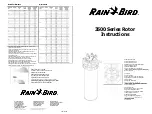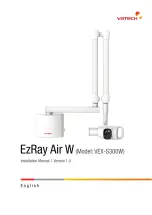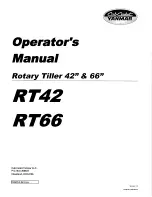
4.1.
Filling and Transport
4.1.1.
Move the empty tank assembly with two persons using the hand holds moulded into
the base of the unit (fig.2).
DO NOT
run the pump without fuel in the tank. To do so will
damage the pump’s internal components and will invalidate your warranty.
4.1.2.
The tank is filled by unscrewing the filler (fig.1.1) in an anticlockwise direction. Refit the
filler cap immediately after filling.
WARNING
take care not to overfill the tank.
4.1.3.
The full tank can be moved by forklift truck using the fork locations shown in fig.2.
Ensure that both the filler (fig.1.1) and security valve (fig.1.3) are closed before moving.
4.1.4. Secure the tank to the carrying vehicle by ratchet straps. Locations for the straps are
moulded into the tank (fig1.7).
4.2.
Fuel Dispensing
4.2.1. Before connecting to a battery, make sure that the pump switch (fig.1.4) is in the ‘off’ (
O
) position.
Connect the battery clips to the 12V battery, observing correct polarity (red clamp to +ve terminal,
black clamp to -ve terminal)
4.2.2. Open the security valve (fig.1.3).
4.2.3. Switch the pump switch to the ‘on’ (
I
) position.
4.2.4. Unwind sufficient hose and place the nozzle in the receiving tank and pull the trigger (fig.3);
delivery will commence and continue until the trigger is released.
4.2.5. The trigger can be locked in one of three positions by engaging the latch (fig.3) to hold the
trigger open.
DO NOT
leave the nozzle unattended with the trigger latched open.
4.2.6. Slight pressure on the trigger will release the latch.
4.2.7. When the level in the receiving tank reaches the nozzle, delivery will stop automatically.
4.2.8. When delivery is complete, switch off the pump and close the security valve.
Ensure that hose is wound into its housing on the tank and that the nozzle is secured in its storage place.
4.2.9.
DO NOT
operate the pump continuously for more than 30 minutes. The duty cycle of the unit is
30 minutes, after which the motor must be left to cool down for a further 30 minutes.
4.2.10.
DO NOT
run the unit for more than 2-3 minutes with the delivery nozzle closed.
5.1.
The pump contains no user-servicable parts. Repairs should only be undertaken by competent persons.
5.2.
Check the integrity of all the hose connections periodically. If any leakage is evident, strip the joint and
wind PTFE tape around the male thread.
5.3.
Check all electrical connections and cables for wear and damage. Rectify any faults found.
5.4.
Keep clean, especially the dispenser nozzle. Clean with a damp, soapy cloth.
DO NOT
use abrasive or
solvent cleaners.
5. MAINTENANCE
4. OPERATION
fig.3
Environmental Protection
Recycle unwanted materials instead of disposing of them as waste. All tools, accessories and packaging should be
sorted, taken to a recycling centre and disposed of in a manner which is compatible with the environment.
When the product becomes completely unserviceable and requires disposal, drain off any fluids (if applicable)
into approved containers and dispose of the product and the fluids according to local regulations.
WEEE Regulations
Dispose of this product at the end of its working life in compliance with the EU Directive on
Waste Electrical and Electronic Equipment (WEEE). When the product is no longer required, it must be disposed
of in an environmentally protective way. Contact your local solid waste authority for recycling information.
NOTE:
It is our policy to improve products continually and as such we reserve the right to alter data, specifications and component parts without prior notice.
IMPORTANT:
No liability is accepted for incorrect use of this product.
WARRANTY:
Guarantee is 12 months from purchase date, proof of which will be required for any claim.
01284 757500
01284 703534
Sole UK Distributor, Sealey Group,
Kempson Way, Suffolk Business
Park
,
Bury St. Edmunds, Suffolk,
IP32 7AR
www.sealey.co.uk
D43012V Issue: 1 - 09/02/16
Original Language Version
© Jack Sealey Limited
fig.2




















